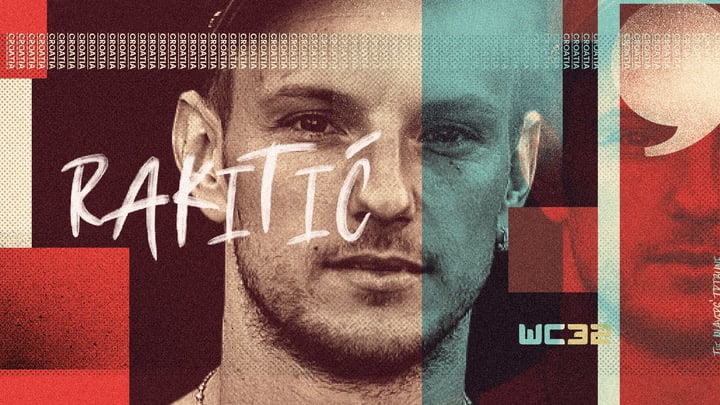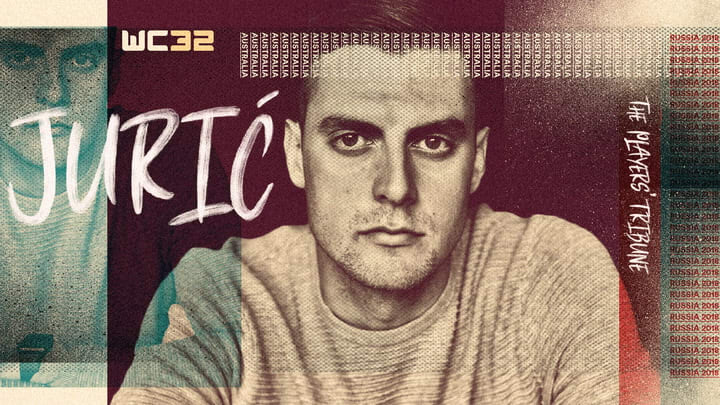
The Best Shirt in the World
The moment my dad took them out of the box, my brother and I knew.…
We were never going to take them off.
Of course, when the box first arrived at our house in Switzerland, we didn’t know what was inside. Scribbled on the top was a return address in Croatia. It was a place we called home, but it was also a place that neither my brother nor I had ever been to before.
We spoke Croatian in the house, and there were plenty of Croatians in our town in Switzerland. But Croatia was still something remote to me. My parents had left when the war broke out in 1991 and we hadn’t ever gone back. My brother, Dejan, and I were born in Switzerland. The Croatia we knew was the one that we saw on on the TV, and in the photos that my parents showed us.
And the phone conversations we’d over hear them having on the telephone.
It was hard as a kid to understand what was going on in the Balkans. My parents never really told me about the war — understandably, they didn’t really want to talk about it. I remember how they’d cry sometimes when they were on the phone with somebody back in Croatia. It just felt sort of like … I don’t know how to explain it. Maybe like a bad dream? We were lucky. We were far away from it, so we didn’t see what was happening. But it was never really far from my parents’ minds. A lot of their friends and family had stayed behind. My parents lost a lot of people who they loved.
And then, I remember when I was only about four or five, I saw a news report on the TV. I’d seen pictures and video of the war, and lying in bed that night I thought, This is impossible. How can this happen?
Even before Croatia had officially declared its independence, our national team had already played a match. I think that tells you how much football means to us, to any country, really, and its people — no matter where they live. So when my dad took a knife and sliced open that box and pulled out two Croatian football shirts for my brother and I … it was very powerful. Like, Yeah, we are a part of this, too.
We slept in those shirts. We wore them to school the next day. And the day after that. We didn’t want to take them off. Wow, we have the Croatian shirt. The white-and-red checkers, but no name on the back. We wanted 10 of them because we didn’t want to wear anything else. They were so special to us.
When I started playing myself, I wasn’t wearing the Croatian shirt. I was wearing the jersey of my other home, Switzerland. I have to be honest … I tell people, “I’m a Swiss guy.” And that always gets strange looks. “Swiss? Ivan Rakitic?” But I was born in Switzerland, I grew up in Switzerland, I went to school in Switzerland, my friends are from Switzerland.
And so I was really proud to wear the Switzerland shirt for five years when I was playing with the youth teams.
But the biggest part of my heart belongs to Croatia. It always has.
A few years after the war ended, my parents and my brother and I were finally able to go and visit Croatia with my parents. And when we got there, the war still wasn’t something anyone wanted to speak about. It was almost like, We have to forget it. We have to keep going on and just put it behind us.
Visiting Croatia for the first time reminded me of Möhlin, our hometown in Switzerland. A lot of Croats moved to the same town we did, so there were a lot Croatian restaurants and families in our neighborhood. And in 1998, when Croatia played in its first World Cup, there were all these Croatian flags hanging from windows and storefronts. Everyone was going crazy.
During the 1998 World Cup, my brother and I watched from our home in Switzerland with our dad — in our shirts — and we were not allowed to talk. For 90 minutes, all that mattered was the match on the television. “We can talk after,” my father would say. “Now, just watch the game.”
You ask any Croatian and they will remember the quarterfinal against Germany. How could they not? We’d only officially been recognized as a team in 1992 and here we were, six years later playing Germany in our first World Cup in a quarterfinal match! My dad was losing his mind. I don’t think I’ve met anyone more football mad then my father, Luka. And that says a lot coming from a guy who plays in Barcelona?. My father took a job in construction once we moved to Switzerland. He’s a strong guy. And when he was younger, he had played football himself. He was a defensive midfielder … who wore the number 4.?
So after Croatia beat Germany?
Yeah… he was flying. A lot of times today I feel like I’m living the dream for both of us. He was playing at a really high level in Bosnia before he made the decision to move to Switzerland. And once he stopped playing himself, he would do anything to come watch my games.
Football and Croatia just mean so much to him.
And when it came time for me to make a decision on whether to play for Switzerland or Croatia, I could hear him pacing outside my door when I called the Swiss coach.
To be honest, there was a time when I thought I’d never play for anybody else but Switzerland. I never thought it was a possibility. I came up playing for Switzerland. That was my team. But 10 years ago Slaven Bilić and the president of the Croatian football federation came to watch me play in Basel. We met afterwards to talk.
First of all to be in the same room as Slaven … yeah, he could’ve said anything and I would’ve been like, “O.K., I want to go with you, please.” He was a hero of mine. But in that moment, he never put any pressure on me. He just told me his plans for the team and how he wanted me to be a part of it.
“Come with me,” he said. “Come to play with our country. We will do it in the best way.”
In my mind, I thought, I’m with you. He just gave me so much confidence and it was like, Wow, just let me go with you. Let’s go!
What can I say about Slaven? He is one of the most important people I’ve met in my football career. Not just as a coach, but as a person. He’s different. He’s so special. He has something that makes you want to play for him today, tomorrow and again and again and again. And you will play your best because he’ll bring it out of you. Because you think, F***, this man will do everything for me.
But even sitting across from Slaven and hearing everything he had to say, I knew I couldn’t make my decision right there. Switzerland had given me so much. So I took some time to think about it. My season with Basel ended and I was at home for a bit before heading to Germany play for Schalke. The national-team decision had been weighing on me for so long. I needed to have it sorted before I left for Germany. I wanted to start with my new club with a clear and focused mind.
Sitting in my room, I still didn’t know what I was going to do. I kept going back and forth and thinking about all the people who had gotten me to where I was.
And then I just thought about what was in my heart.
And I picked up the phone and started to dial.
The first call I made was to the Swiss coach. I had been part of the Swiss team my whole career, and it was important to me to call him first, to explain to him why I was going to play for Croatia. I told him that it was not a decision against Switzerland. It was just a decision for Croatia. And after that, I called Slaven.
“I’ll go with you. I’m going to be a part of this.”
And Slaven told me, “All the people of Croatia will be so proud to have you here. Don’t think about anything else, just enjoy football.”
I wasn’t on either call for long, but I could hear my father outside my door the entire time, his footsteps in the hallway.
When I finally opened the door he just stopped and looked at me. I hadn’t told him what I had decided ahead of time, but he told me that, no matter what I chose, he would support me. It was a huge moment for the two of us….
So … I decided to play a little joke on him.
“I will keep playing for Switzerland,” I told him.
“Oh,” my father said. “O.K. Good.”
“No, no,” I said laughing. “I’m going to play for Croatia.”
Tears started to fill up his eyes, and he began to cry.
I think about my dad and that moment a lot when I step onto the field for Croatia. I know my father would like to be where I am, standing in my boots. I know so many Croatians would like to, as well. To be able to play for your country and defend your colors … there are no words to describe it.
The people from Croatia are special. They have this … character about them. When I’m out there with my team in front of our supporters, it’s almost like … you never want the game to end. It’s like, I don’t know, like … I just want to give everyone a big hug or something. You never want to leave. You want to play every day with them. You want to be there every day.
It’s funny, I’m a lot older now than I was when that box arrived at our house. But I still never want to take the shirt off.
There’s a pressure that comes with wearing that shirt. But it’s a good pressure, I think. You want to show the world what Croatia can do. You want to carry on the work of players like Slaven and Davor Šuker.
I think we are still showing the world what we can do. Our qualifying match against Greece was the best we’ve played in like five or six years. I just told the guys in the dressing room, “Let’s keep going like this.”
Luka Modrić and I just looked and each other like, Wow, why have we not done this before?
As you may have read before, my own family has grown in different countries as well. My wife is Spanish, and we’ve been raising our two daughters in Barcelona. It’s special because my daughters have the same experience that I did — of being from a different country and seeing life in different ways. And my little girls are my biggest fans, for sure.
So before the tournament started, I had a very special order I needed to make…
And I came home one day with a box for them. Two new Croatian shirts.
They told me that they never want to take them off. ?
I know how they feel.

